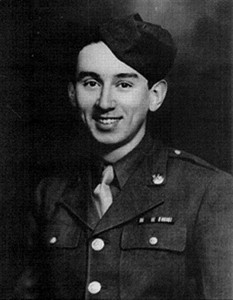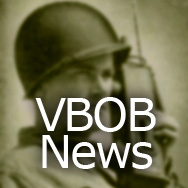Battle of the Bulge Survivors Gather; Recall Snow, Encounters with the Foe
By Helen McCaffrey; Reprinted with Permission from the Cape May Herald
Trish Hebert put it best when she said, “It’s important to remember everybody who served and the lives that were lost saving our country.” On Dec. 19 that is exactly what a group of over 40 did when they gathered at Mad Batter restaurant to honor the survivors of the Battle of the Bulge.
The famous battle that stopped the last massive push of the Nazi army occurred between Dec. 16, 1944 and Jan. 25, 1945. It involved American, French, British, Canadian, Belgian and German troops. When it was over, the official list of American casualties was 80,987 including 19,000 killed.
The Battle of the Bulge, as contemporary media named it, was the bloodiest battle of World War II for the Americans. The German casualties were numbered at 84,834. In the end, the Nazi counter-offensive failed and the Allies went on to liberate Europe. The outcome was not assured, however, when the Nazis made their surprise attack.
Arlette Michaelis was a child of 15 living in a country occupied by the Nazis. At the time of the battle, her parents Maurice and Georgette de Monceau, along with her brother Guy, were all in prison. They had been put there by the Nazis for resistance activities.
“I had to take care of my younger sister, Jilette who was 13,” recalled Michaelis. She remembered how frightened the Belgian people were that the Germans would have resurgence. The snow was so bad nothing could move and the clouds so thick that the planes could not fly,” she said.
The Germans finally ran out of gas – literally. Michaelis said the biggest lesson learned was how precious freedom is and how any country could lose it just like Belgium did. “That is my big fear,” she said. She recounted it all in her book Beyond the Ouija Board. “We will always be grateful to the Allies and the Americans.”
Ed Steinberg serves as the president of the Veterans of the Battle of the Bulge – South Jersey Chapter LXI. Steinberg is the son of Albert, a Bronze Star recipient and survivor of the battle. He received the baton from Gus Epple who was present.
Epple asked that any World War II veteran share one story. He told of his own “Baptism of Fire.” That first night of engagement, Epple was asked by his sergeant to go with him across the field of battle to search for the wounded and take them to safety. It was one wounded man at a time all the while dodging Nazi strafing. “That night I learned what was meant by ‘dead weight.’ That was my first day of combat.”
A young Al McGorsky had a message to deliver on Christmas Eve. As he drove across the open field, his jeep broke down in the muck. “What the hell are we going to do?” he thought.
The 18-year-old prayed. The message got delivered. “Bastogne is the word that describes the rest of your life,” he declared. He also recalled running into three young German soldiers who were leaving the battlefield. “They had enough. They were quitting. My buddy wanted to kill them but I said, ‘No put ‘em in the jeep.’ We did and turned them over to the French.” He said he got in trouble for not killing them but added, “I couldn’t. It was against my rules to shoot ‘em in cold blood.”
James Dougherty traveled all the way from Ashland, Va. to honor his late father-in-law, Ted Kerwood. William deWald, accompanied by his companion, Debbie Longo, presented a check to honor the memory of his father Nicholas B. deWald who died in May 2014 at age 97. He expressed gratitude for all he had learned from his father and the other brave men who fought that frigid winter.
Rev. Ted Osler of First United Methodist Church in Court House delivered the invocation. Retired U.S. Navy Cmdr. Mike Gross gave the keynote speech. Gross came equipped with a treasure trove of photographs taken by a 16-year-old soldier Louis Glaven.
Two days before Glaven died he passed on the invaluable photos to Gross. They had been hidden in his attic for nearly three quarters of a century. Glaven used a Kodak Brownie camera to take dozens of pictures of the landing on Omaha Beach.
“The albums are destined for the Navy War College. This is a story that should be told, must be told and is being lost,” said Gross.
Joseph Hebert, Navy captain, retired, is engaged in reaching out to young people to make sure they know their history.

The event was hosted by owner of the Mad Batter, Mark Kulkowitz. His father, Harry, fought in the battle when he was 19. For his exceptional bravery Kulkowitz was awarded the Legion d’Honeur Medal by the government of France.
Mark recently took him to Normandy for the remembrance there and he was greeted by the heads of state, including President Barack Obama.
Alex Jackson told the Herald that fewer school principals are inviting veterans to tell their histories. “They say they can’t fit it in. I’d like to see that change. Ask your local school to host these men – these brave warriors. We owe them and our children to keep this going,” Jackson added.
